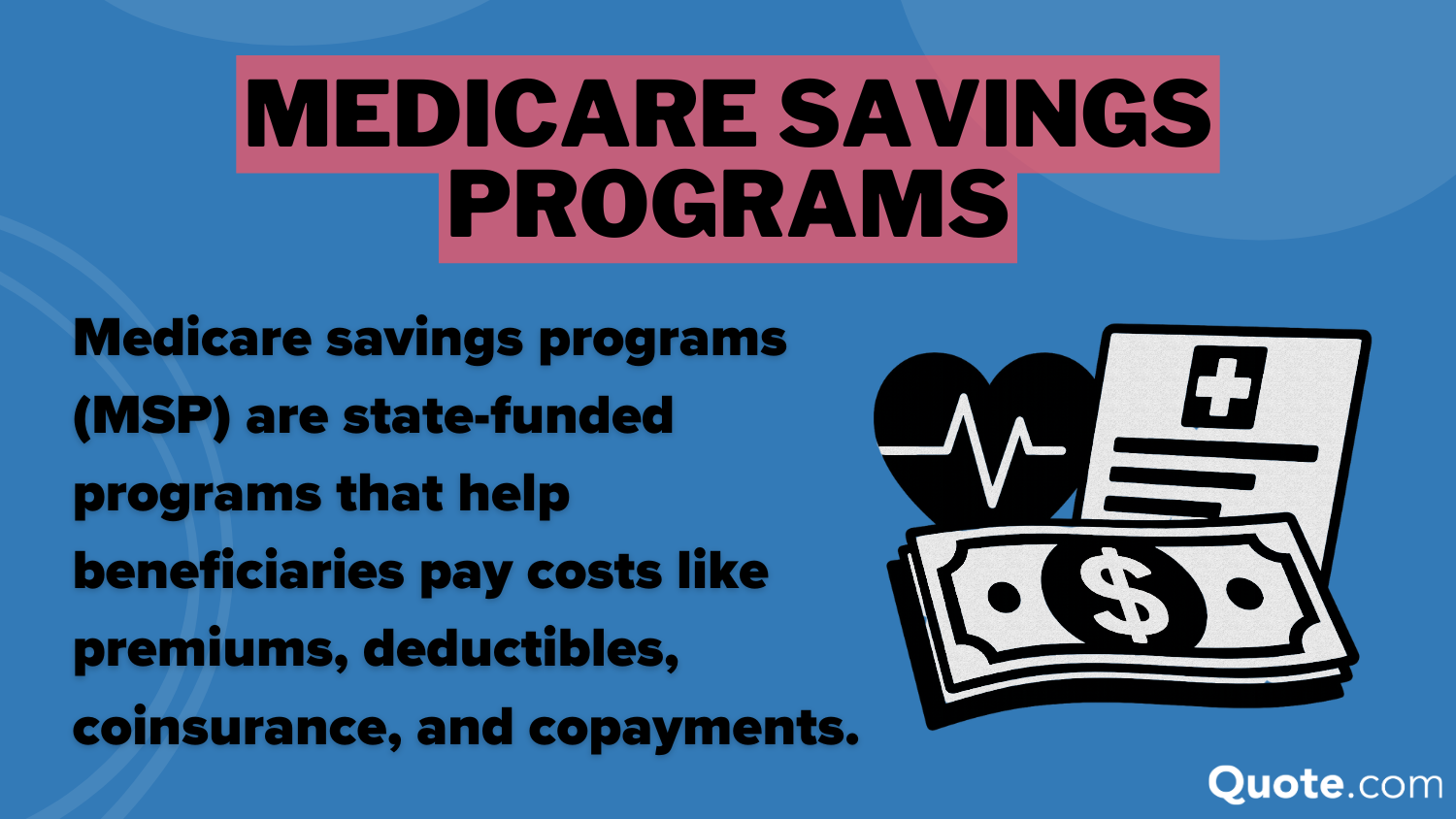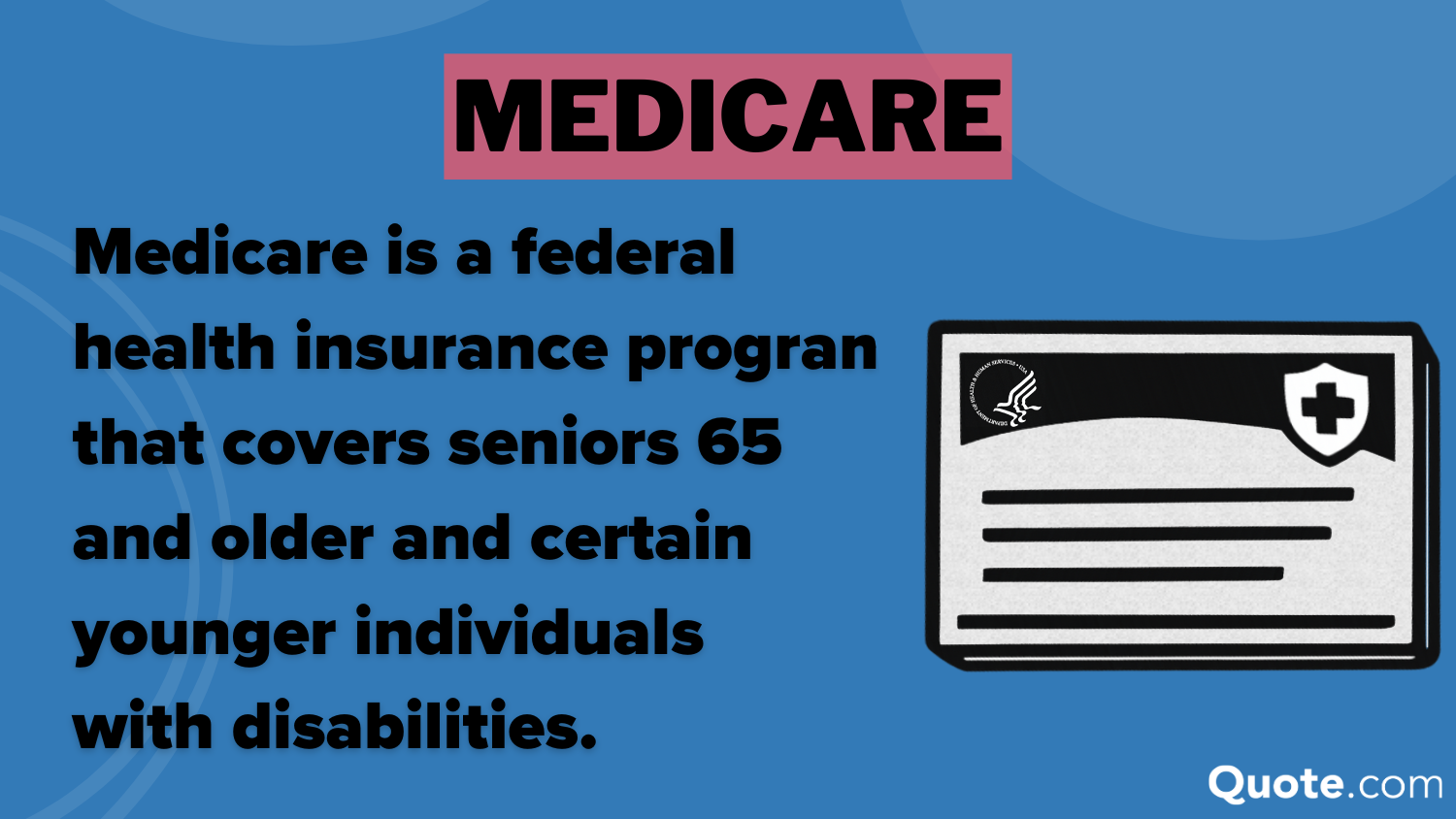What are Medicare Savings Programs?
Medicare Savings Programs for seniors help reduce insurance costs by covering Medicare premiums, deductibles, and more. You must have less than $10,000 in assets to qualify for Qualified Medicare Beneficiary (QMB), Specified Low-Income Medicare Beneficiary (SLMB), and Qualifying Individual (QI) programs.
Read more Secured with SHA-256 Encryption



Table of Contents
Table of Contents


Insurance Copywriter
Malory Will has an M.A. in English from Arizona State University. She has over four years of experience in writing for the insurance industry. With a background in health, auto, life, and homeowners insurance, Malory is passionate about making complex insurance topics clear and approachable. Her goal is to help readers make informed decisions with confidence.
Malory Will


Managing Editor
Daniel S. Young began his professional career as chief editor of The Chanticleer, a Jacksonville State University newspaper. He also contributed to The Anniston Star, a local newspaper in Alabama. Daniel holds a BA in Communication and is pursuing an MA in Journalism & Media Studies at the University of Alabama. With a strong desire to help others protect their investments, Daniel has writt...
Daniel S. Young


Licensed Insurance Broker
Zach Fagiano has been in the insurance industry for over 10 years, specializing in property and casualty and risk management consulting. He started out specializing in small businesses and moved up to large commercial real estate risks. During that time, he acquired property & casualty, life & health, and surplus lines brokers licenses. He’s now the Senior Vice President overseeing globa...
Zach Fagiano
Updated December 2025
What are Medicare Savings Programs? These state-funded programs can help finance what your health insurance won’t cover, including prescription drug costs.
- There are five types of Medicare Savings Programs
- Each Medicare savings plan comes with income and resource requirements
- Medicaid recipients can receive additional Medicare benefits
Social Security Medicare Savings Programs (MSPs) cover premiums, deductibles, coinsurance, and copayments through your state’s Medicaid program. The top three types of Medicare Savings Programs for seniors are Qualified Medicare Beneficiary (QMB), Specified Low-Income Medicare Beneficiary (SLMB), and Qualifying Individual (QI) programs.
Have Medicare questions? Call (855) 634-0435 to get answers from a licensed insurance agent.
Certain income requirements apply, but there are many programs you could qualify for. Enter your ZIP code to start comparing Medicare insurance plans today.
Types of Medicare Savings Programs
What do all Medicare Savings Programs do? Each MSP helps cover all or a portion of out-of-pocket Medicare costs. You might also want to compare the differences between Original Medicare and Medicare Advantage to find more ways to save.
What are the three types of Medicare savings programs? QMB, SLMB, and QI programs are the most common examples of Medicare Savings Programs.
Qualified Medicare Beneficiary (QMB) Program
QMB plans cover Part A and Part B premiums, deductibles, coinsurance, and copayments for Medicare-covered services. You may still receive a bill for Part D prescription copayments from Medicaid.
Specified Low-Income Medicare Beneficiary (SLMB) Program
SLMB plans cover Part B premiums and provide assistance with prescription drug costs, but you cost-share for many medical services. This MSP works best for individuals with very few healthcare needs beyond regular checkups.
Qualifying Individual (QI) Program
The QI Medicare savings program is the most popular. It covers Part B premiums but requires a yearly application because it’s only offered on a first-come, first-served basis.
Medicaid vs. Medicare Savings Programs
Medicare Beneficiaries who qualify for or are already enrolled in Medicaid can receive additional benefits with these plans:
- Qualified Disabled Working Individual (QDWI) Program: Available to individuals who meet income and disability requirements to cover Part A premiums, but doesn’t provide full Medicaid benefits.
- Qualified Medicare Beneficiary Plus (QMB+) Program: Offers a higher level of coverage by including everything in QMB plans plus full Medicaid benefits.
- Specified Low-Income Medicare Beneficiary Plus (SLMB+) Program: Covers Part B premiums and provides full Medicaid benefits, with limited assistance from state Medicaid agencies for cost-shares.
Is the Medicare Savings Program the same as Medicaid? Both Medicare and Medicaid provide health insurance coverage, but Medicaid is partially funded by the state and available to low-income individuals of all ages. Get the full breakdown in our expert guide to Medicaid.
Get a Free Medicare Plan Review
Speak With a Licensed Insurance Agent Today
Secured with SHA-256 Encryption
Medicare vs. Medicare Savings Programs
Medicare provides health insurance coverage to seniors for free or at a reduced cost, but you’re still responsible for out-of-pocket costs like deductibles and copays. That’s where MSPs come in.
Medicare Savings Programs help cover frequent doctor visits, ongoing treatments, or prescription medications.
Before you sign up for Medicare coverage, compare how much Medicare insurance plans cost. For instance, Part A premiums are typically free, while Part C and Part D costs vary.
Taking the time to compare these costs upfront can help you avoid unexpected expenses later.
Medicare Costs by Plan Type
Plan Rate/mo Deductible MOOP
Medigap $35-$488 $0-$2,800 $7,500
Part A $0-$505 $1,676 NA
Part B $185 $257 NA
Part C $0-$200 $0-$200 $8,850
Part D $34 $0-$545 $2,000
Once you know how much you need to pay, you can learn how to qualify for different types of Medicare Savings Programs for seniors. Whether you need assistance with premiums, deductibles, or other out-of-pocket expenses, each MSP is designed to meet different financial needs.
How to Qualify for Medicare Savings Programs
To qualify for Medicare Savings Programs , you must first be eligible for Medicare Part A. Most people get Medicare at age 65, but many qualify much earlier based on disability or certain medical conditions. Your income and resources determine which MSP you qualify for, but Medicare eligibility is always the first requirement.
Most adults qualify once they reach age 65, regardless of income or employment status. Individuals diagnosed with permanent kidney failure or amyotrophic lateral sclerosis qualify for Medicare at any age.
Medicare Savings Program eligibility depends on income and assets like property, retirement accounts, and other investments.
The table below lists the federal requirements:
Medicare Savings Programs: Monthly Income Limits
Qualifying Program Individual Married Couple
QI Income Limit $1,781 $2,400
QI Resource Limit $9,660 $14,470
QMB Income Limit $1,325 $1,783
QMB Resource Limit $9,660 $14,470
QWDI Income Limit $5,302 $7,135
QWDI Resource Limit $4,000 $6,000
SLMB Income Limit $1,585 $2,135
SLMB Resource Limit $9,660 $14,470
Some states don’t count certain types of income. Even if you earn more than what’s listed above, you could still qualify for savings depending on where you live.
In many cases, states also offer special exceptions, deductions, or flexible rules that make qualifying easier than it appears on paper. Factors like medical expenses, household size, and the type of income you receive can all influence your eligibility.
Compare health insurance plans and don’t hesitate to apply for savings anyway.
How to Apply for Medicare Savings Programs
Applying for Medicare Savings Program is often simpler than people expect. If you’re enrolled in Medicare Part A and meet your state’s income and resource limits, you may be eligible for help covering some of your biggest healthcare costs.
Many people qualify for Medicare Savings Programs without realizing it. These programs can cover big costs like premiums and deductibles.
Karen Condor Insurance and Finance Writer
Since MSPs are managed by state Medicaid programs, contact your local Medicaid office to apply. You can find the office nearest you at Medicaid.gov.
Follow these steps to prepare your application:
- Confirm Eligibility: Review the MSP income and resource limits.
- Complete Application: Get the application online or in person at the local office. Provide Social Security numbers, proof of residency, and proof of income.
- Submit Application: Submit the application online or in person. You may be required to scan or mail copies of your personal documents.
Follow up with the Medicaid office to ensure your application is being processed. Once approved, you will receive notification of your benefits, usually within 45 days.
Get a Free Medicare Plan Review
Speak With a Licensed Insurance Agent Today
Secured with SHA-256 Encryption
How to Save Money on Medicare
Medicare Savings Programs (MSPs) are essential for managing healthcare costs, especially for those with limited income and resources. These programs can dramatically lower what you pay out of pocket each month by covering some of the biggest Medicare costs that many seniors struggle with.
These state-funded programs pay for premiums, deductibles, coinsurance, and copayments. The three main types of Medicare Savings Programs are:
- Qualified Medicare Beneficiary (QMB)
- Specified Low-Income Medicare Beneficiary (SLMB)
- Qualifying Individual (QI)
Additionally, the Qualified Disabled Working Individual (QDWI) program supports disabled individuals with their Part A premiums. Exploring health insurance guides and savings programs online can also help you get cheaper healthcare.
To apply for MSPs, contact your local Medicaid office. The process involves confirming eligibility, gathering necessary documents, and submitting an application online or in person.
Call (855) 634-0435 to speak with a licensed insurance agent and compare Medicare plans near you.

Frequently Asked Questions
What are Medicare savings account plans?
What is a Medicare Savings Program? Medicare Savings Programs (MSPs) are state-funded plans for Medicaid recipients to help cover out-of-pocket costs like copays and deductibles.
What does the Medicare Savings Program pay for?
Depending on which MSP you qualify for, it can cover:
- Medicare Part A premiums
- Medicare Part B premiums
- Deductibles
- Coinsurance
- Copayments
Who qualifies for the Medicare Savings Program?
Do I qualify for the Medicare Savings Program? Generally, you qualify if you:
- Are enrolled (or eligible to enroll) in Medicare Part A.
- Have limited income and resources, within your state’s limits.
- Meet state residency and citizenship/immigration requirements.
Is the Medicare Savings Program the same as Medicaid?
Not exactly. MSP is run by Medicaid, but it’s specifically designed to help Medicare beneficiaries pay Medicare costs.
Medicaid itself is broader, covering full healthcare costs for people with low income (including services Medicare doesn’t cover, like long-term care).
Read more: Medicare Parts A, B, C, & D
Can you use Medicaid with Medicare?
Yes, if you qualify for or are already enrolled in Medicaid, you can use it as your supplemental coverage to Medicare. Depending on the income and disability requirements, you may also enroll in QMB+ or SLMB+ savings programs. Check your Medicaid eligibility.
What are the four types of Medicare savings programs?
The four types of MSPs are:
- Qualified Medicare Beneficiary (QMB) Program: Covers Part A and Part B premiums, deductibles, coinsurance, and copayments for Medicare-covered services. You may still receive a bill for Part D prescription copayments from Medicaid.
- Specified Low-Income Medicare Beneficiary (SLMB) Program: Covers Part B premiums and provides assistance with prescription drug costs, but you cost-share for many medical services.
- Qualifying Individual (QI) Program: Covers Part B premiums and requires an annual application, as it’s only offered on a first-come, first-served basis.
- Qualified Disabled Working Individual (QDWI) Program: Available to individuals who meet income and disability requirements to cover Part A premiums, but doesn’t provide full Medicaid benefits.
Each plan comes with income requirements, so check with your local Medicaid office to make sure you qualify.
What is the difference between Medicare and a Medicare Savings Program?
Medicare is a type of health insurance available to seniors over 65 that covers medical care and hospital and hospice stays. Medicare Savings Programs are not insurance plans. MSPs pay for excess Medicare costs not covered by health insurance, such as deductibles and copayments.
Read our expert guide to Medicare.
Is Medicare free at age 65 for seniors?
Medicare Part A, which covers hospital stays and hospice care, is free for almost everyone over 65. Most beneficiaries are only responsible for Part B and Part C (Medicare Advantage) costs. Call (855) 634-0435 to review Medicare coverage and costs with a licensed insurance agent today.
Does everyone have to pay $170 a month for Medicare?
This is the average cost of Medicare Part B premiums, which everyone is required to pay. If you can’t afford your Medicare premiums, apply for a Medicare Savings Program. QMB, SLMB, and QI programs all offer assistance for Part B premiums and other out-of-pocket costs. Learn how much Medicare costs.
What is an MSP that only pays for Medicare Part A premiums?
Qualified Disabled Working Individual (QDWI) Programs only cover Part A premiums for beneficiaries who meet income and disability requirements.
Who is exempt from paying Medicare Part B premiums?
What is the income limit for the Medicare Savings Program?
How is Medicare funded?
How does the Medicare Shared Savings program work?
Does Medicare look at your bank account?
How much money can you have in the bank if you’re on Medicare?
Is the Medicare Savings Program available in California?
What does the Medicare Savings Program in Texas cover?
How does Medigap work with Medicare Savings Programs?
Get a FREE Quote in Minutes
Insurance rates change constantly — we help you stay ahead by making it easy to compare top options and save.











